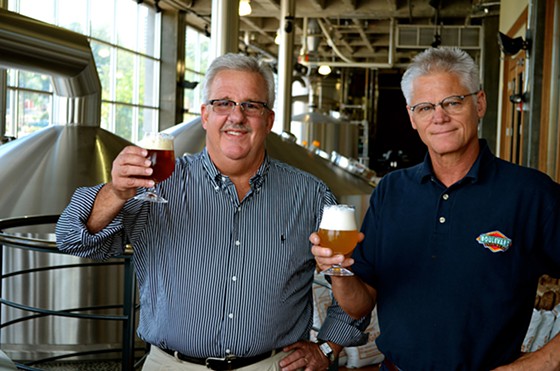
Exactly 365 days ago, Boulevard Brewing founder John McDonald told Brewbound that that he wasn’t interested in selling the country’s 19th largest brewery.
What a difference a year can make.
But yesterday, the owner of the Kansas City Mo.-based craft brewery announced that Belgium-based Duvel Moortgat will purchase the company as part of a deal that will combine Boulevard with the domestic and import branches of Duvel and Brewery Ommegang. While terms of the deal were not disclosed, industry sources have estimated its value as at least $100 million.
While public reaction was mixed — both online and off — McDonald attempted to reach out to the brewery’s customers through an online letter explaining his rationale behind the sale.
“I’m not getting any younger, and the long-term future of the brewery has weighed on my mind for the past several years,” he wrote. “After long discussions with my family, we determined that we wanted to find a way to take Boulevard to the next level while retaining its essence, its people, its personality — all the characteristics that make our beer and our brewery so important to Kansas City and the Midwest.”
Reaction on the social networking site Twitter, where many brewers air their thoughts, was swift.
The merger has been met with mixed emotions by many craft beer industry members active in the twittersphere. After the news broke, a fellow Missouri craft brew house, Schlafly, sent congratulations via the social networking site. That company recently went through a sale of its own: last January, Schlafly co-founders Dan Kopman Tom Schlafly agreed to sell 60 percent of his company to a St. Louis, Mo. investment group, Sage Capital.

But the Boulevard buyout seemed to have drawn the ire of Stone Brewing Co., which took the opportunity today to remind its own set of twitter followers that it will never “sell out.”
Stone’s founder, Greg Koch, similarly mentioned that he’d never sell out — but the simple fact that Koch was airing his thoughts on the issue of continuity, is indicative of a market in which once-uncertain ventures dealing in oddball brews have become long-term businesses requiring succession planning. At this point, many brewery startups are looking at it as part of their business plans.
It should be top of mind for brewery owners who, like McDonald, thrived following the first craft boom and bust cycle, said Craig Farlie, the managing director of investment banking firm Farlie Turner & Company.
“I would say people who were in the ‘Class of ‘88 or ‘89’ should be thinking through issues like this,” he said. “They have gotten to the point where they have spent 25 years building a business and if they don’t have a coherent plan for succession, they are ignoring one of their primary responsibilities as the architect of the business.”
That responsibility was something McDonald began placing greater emphasis on in the last year.
“Finding the right partner was hugely important to me,” McDonald said. “At my age, I really wanted to find a partner that could take us in the right direction going forward.”
When word spread that McDonald was shopping Boulevard, the offers poured in. McDonald rejected bids from private equity firms and strategic buyers alike, and when MillerCoors came knocking, he took the call but eventually passed.
So what’s the reaction from other industry members?
Townsend Ziebold, a managing partner at First Beverage Group, which acted as Boulevard’s investment banker, believes it could serve as somewhat of a wakeup call for brewery owners.
“I think it will create a more robust dialogue amongst craft beer owners who are starting to think about their own [merger and acquisition] decisions,” he said. “It will cause some craft owners to think about when the time is right.”
Farlie agreed.
“I think anyone in the business has to look at this deal and think ‘what does it mean for me?’” he said. “This is where the industry is headed. People can be upset about it and beat their fists and decry the fact that it is taking the soul out of craft beer, but this is where it is headed. There is too much money in the industry right now and people have started paying attention to it.”
More deals are coming, he added.
“Right now the industry is hot,” said Farlie. “There is money looking to come into the industry and it is growing upwards of 20 percent per year. We are in a window for craft beer where people are willing to pay much higher multiples for a craft beer business.”

Ziebold and Farlie agreed, however, that the sales window won’t stay open forever.
“The window is not closing but I think it is closing on finding the ideal buyer,” said Ziebold. “At some point, multiples will start to trend down, and if you care about getting a really great multiple, now is the right time.”
As for any potential fear that distribution of the Boulevard brand could change in some markets, at least one wholesaler Brewbound spoke with to isn’t too concerned.
Brian Murphy, the director of sales and marketing for Massachusetts Beverage Alliance (MBA) said he isn’t worried about losing the brand to L. Knife & Son, a competitor that sells the Duvel USA and Brewery Ommegang portfolio.
“We are the third largest Boulevard Smokestack Series market in the country,” he said. “We outperform all other markets and Boulevard is one of our top priorities. I actually look at this as an opportunity to grow our portfolio with the Duvel and Ommegang brands and we would definitely be open to doing that.”
Boulevard comprises about 28 percent of MBA’s gross revenue, Murphy said.
